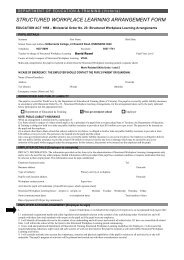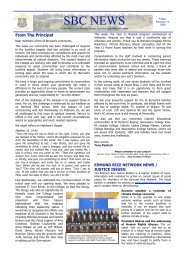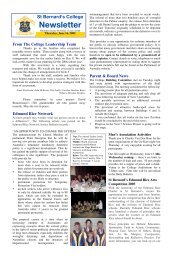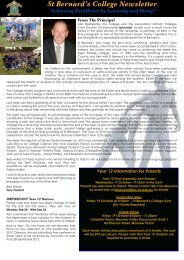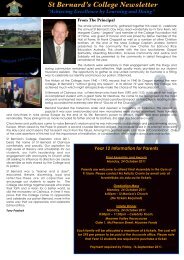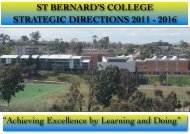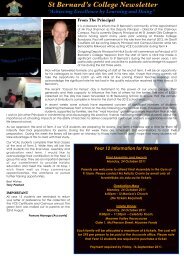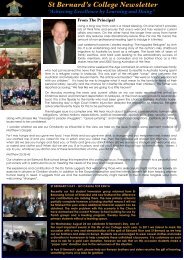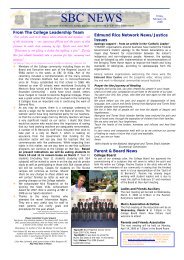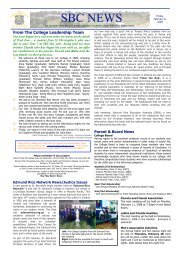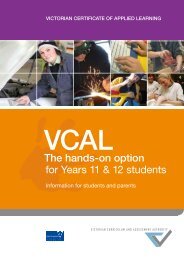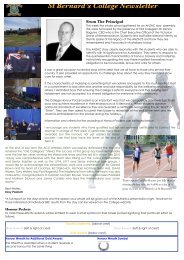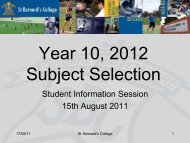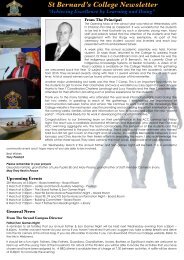edmund rice education australia the charter
edmund rice education australia the charter
edmund rice education australia the charter
Create successful ePaper yourself
Turn your PDF publications into a flip-book with our unique Google optimized e-Paper software.
EDMUND RICE EDUCATION<br />
AUSTRALIA<br />
THE CHARTER<br />
A PROCLAMATION OF AN AUTHENIC EXPRESSION OF<br />
EDMUND RICE EDUCATION<br />
AS APPLIED TO<br />
CATHOLIC SCHOOLS IN THE EDMUND RICE TRADITION<br />
One of a series of core documents prepared by<br />
The National Planning Committee for Schools Governance<br />
Christian Bro<strong>the</strong>rs Australia
PROCLAMATION<br />
THE CALL TO RENEWAL<br />
EDUCATING THE MINDS AND HEARTS OF THE YOUNG<br />
The Christian Bro<strong>the</strong>rs’ international Congregation Chapter of 2002, held in Rome, recognised<br />
that a call to educate <strong>the</strong> minds and hearts of <strong>the</strong> young is at <strong>the</strong> “Heart of Being Bro<strong>the</strong>r”. In its<br />
deliberations <strong>the</strong> Chapter “acknowledged <strong>the</strong> immense contribution of <strong>the</strong> last 200 years that<br />
Bro<strong>the</strong>rs and <strong>the</strong>ir colleagues have made to <strong>the</strong> liberating <strong>education</strong> of <strong>the</strong> young”.<br />
It is timely that this Chapter directs us to identify <strong>the</strong> distinctive cultural characteristics of<br />
Catholic schools that are in <strong>the</strong> Edmund Rice tradition and to develop a network of those<br />
involved in <strong>the</strong> transmission and development of <strong>the</strong> Edmund Rice charism through our schools.<br />
These distinctive cultural characteristics underpin <strong>the</strong> Charter, which aims to express <strong>the</strong><br />
Edmund Rice tradition as an <strong>education</strong>al vision for Australian schools owned and operated by<br />
<strong>the</strong> Christian Bro<strong>the</strong>rs in <strong>the</strong> 21 st century.<br />
We, <strong>the</strong> Leaders of <strong>the</strong> four Australian Provinces, proclaim this Charter to enable schools to<br />
au<strong>the</strong>nticate <strong>the</strong>ir endeavour in this tradition. The formulation of <strong>the</strong> Charter has been <strong>the</strong> result<br />
of consultation and collaboration by <strong>the</strong> Christian Bro<strong>the</strong>rs and <strong>the</strong>ir co-workers in <strong>the</strong> schools<br />
throughout Australia. Embraced by each school, <strong>the</strong> Charter aims to inspire school communities<br />
to foster energetically <strong>the</strong> vision of a charismatic leader, Blessed Edmund Rice, in <strong>the</strong> Spirit of<br />
Christ and <strong>the</strong> <strong>education</strong>al mission of <strong>the</strong> Catholic Church.<br />
As a living document <strong>the</strong> Charter will continue to evolve through review and reflection as <strong>the</strong><br />
demands of our changing times are read and interpreted in <strong>the</strong> light of <strong>the</strong> unchanging Gospel.<br />
Given our imprimatur and proclaimed in Perth Western Australia this 12 th day of March 2004.<br />
_________________ __________________ __________________ __________________<br />
Br Kevin Ryan cfc Br Peter Dowling cfc Br Laurie Needham cfc Br Luke Quinn cfc<br />
Province Leader Province Leader Province Leader Province Leader<br />
Holy Spirit Province St Patrick’s Province St Mary’s Province St Francis Xavier Province<br />
WA & SA Vic & Tas NSW & ACT Qld & NT
CONTENTS<br />
SECTION I<br />
JESUS CHRIST<br />
SECTION II<br />
BLESSED EDMUND RICE<br />
SECTION III<br />
CATHOLIC EDUCATION<br />
SECTION IV<br />
CATHOLIC EDUCATION<br />
IN THE EDMUND RICE TRADITION<br />
SECTION V<br />
CULTURAL CHARACTERISTICS<br />
AT THE HEART OF A CATHOLIC SCHOOL<br />
IN THE EDMUND RICE TRADITION<br />
SECTION VI<br />
APPLICATION OF THE CHARTER
SECTION<br />
JESUS CHRIST<br />
At <strong>the</strong> heart of <strong>the</strong> Christian Gospel is Jesus Christ, <strong>the</strong> Incarnate Word of God. Christ reveals<br />
<strong>the</strong> Spirit and face of <strong>the</strong> Fa<strong>the</strong>r and <strong>the</strong> au<strong>the</strong>ntic form of our humanity. He is <strong>the</strong> touchstone<br />
against which we measure <strong>the</strong> quality of every aspect of our lives. He is <strong>the</strong> cornerstone who<br />
shapes and directs our Christian living.<br />
Jesus is <strong>the</strong> embodiment of <strong>the</strong> love and forgiveness of God acting in <strong>the</strong> power of <strong>the</strong> Spirit in<br />
every age. In His words and deeds, in His life, death and resurrection, Jesus calls men and<br />
women to follow Him. He saw in each individual a human person made in <strong>the</strong> image and<br />
likeness of God. Jesus had a vision of what people could be and gave His very life as a gift that<br />
this might be achieved.<br />
Great Christians, in living union with Christ, have shared His vision through <strong>the</strong> ages. Their<br />
intimacy with God gives <strong>the</strong>m a new way of looking at <strong>the</strong> world. Their eyes have opened to<br />
<strong>the</strong> beauty, value and dignity of every human person. Such a person was Blessed Edmund Rice.<br />
SECTION II<br />
BLESSED EDMUND RICE<br />
Life<br />
Edmund was born in Callan, County Kilkenny, Ireland, in 1762. As a young man, he came to <strong>the</strong><br />
bustling city port of Waterford and worked in his uncle’s business. He was talented and<br />
energetic and became a very wealthy man. In 1785 he fell in love and married Mary Elliot. His<br />
happiness was shattered by <strong>the</strong> tragic death of his wife just four years later. Mary died in<br />
childbirth, and Edmund was left with a handicapped daughter, also named Mary. This<br />
shattering experience was <strong>the</strong> turning point in his life.<br />
Edmund spent more and more time in prayer and in helping and empowering great numbers of<br />
people in Waterford who suffered poverty and injustice. In 1802 he set up a free school for<br />
poor young boys. Having provided for his daughter, Mary, he left his comfortable home and<br />
lived above <strong>the</strong> school he had recently founded.<br />
Influenced by <strong>the</strong> work of Nano Nagle, <strong>the</strong> founder of <strong>the</strong> Presentation Sisters, he ga<strong>the</strong>red<br />
around him a group of men. These he formed into a community of religious bro<strong>the</strong>rs dedicated<br />
to “raising up <strong>the</strong> poor”.<br />
Charism - The Gift of Edmund Rice to Church and Society<br />
Throughout <strong>the</strong> ages, various ways of proclaiming <strong>the</strong> gospel and witnessing to <strong>the</strong> Kingdom<br />
have emerged within <strong>the</strong> Church.<br />
Every era can boast followers of Jesus who, under <strong>the</strong> influence of <strong>the</strong> Holy Spirit, turn <strong>the</strong>ir<br />
individual gifts and personality to <strong>the</strong> service of God’s Kingdom in <strong>the</strong>ir world, sometimes with<br />
remarkable ingenuity and in ways totally attuned to <strong>the</strong> historical situation.<br />
Although <strong>the</strong>ir ministry has its beginnings in <strong>the</strong>ir own individual gifts and abilities that are<br />
given <strong>the</strong> name of charism, <strong>the</strong> ministry is always carried out on behalf of <strong>the</strong> Christian<br />
community in response to a call of God. The unique gifts of <strong>the</strong> founders of religious<br />
congregations bring about God’s reign in a special manner.
Often charism becomes officially recognised and built into <strong>the</strong> structure of <strong>the</strong> Church’s mission,<br />
regulated by canon law and with clear accountabilities. Such was <strong>the</strong> case with Blessed<br />
Edmund Rice and <strong>the</strong> Congregation of Christian Bro<strong>the</strong>rs that he founded. Through Edmund’s<br />
meditation on <strong>the</strong> Gospel, he became more keenly aware of <strong>the</strong> oppressive social and political<br />
realities of his day. He recognised that <strong>the</strong> <strong>education</strong> system discriminated against <strong>the</strong> poor. In<br />
<strong>the</strong> unschooled and undisciplined boys of Waterford, he found images of God.<br />
Deeply aware of <strong>the</strong> Fa<strong>the</strong>r’s providential presence in his life,<br />
Edmund was moved by <strong>the</strong> Holy Spirit to open his whole heart<br />
to Christ present and appealing to him in <strong>the</strong> poor.<br />
With his sense of <strong>the</strong> God-given dignity of <strong>the</strong> poor, he saw <strong>education</strong> as a means by which to<br />
recognise and promote this dignity, through liberation for personal and communal<br />
empowerment.<br />
Legacy<br />
Edmund is honoured as <strong>the</strong> founder of both <strong>the</strong> Christian Bro<strong>the</strong>rs and <strong>the</strong> Presentation<br />
Bro<strong>the</strong>rs. For more than two centuries, many have been and continue to be attracted by his<br />
vision and generosity. The mission continues today on all five continents through <strong>the</strong> ministry<br />
of Christian Bro<strong>the</strong>rs and laity called to serve in this vocation of Catholic Education.<br />
The Christian Bro<strong>the</strong>rs came to Australia — first of all, to Sydney — in 1843, at <strong>the</strong> invitation<br />
of Archbishop Polding, but left in 1848.<br />
They arrived in Melbourne in 1868 at <strong>the</strong> invitation of Bishop Goold. Within thirty-five years,<br />
<strong>the</strong> remarkable Bro<strong>the</strong>r Patrick Ambrose Treacy had responded to invitations from various<br />
Bishops to establish schools in <strong>the</strong> Dioceses of Brisbane, Sydney, Adelaide, Dunedin and Perth.<br />
The task of <strong>the</strong> Bro<strong>the</strong>rs in Australia, as mandated by <strong>the</strong> Bishops, was <strong>the</strong> evangelisation of<br />
<strong>the</strong> mainly poor, mainly Irish, Catholic families of <strong>the</strong> colonies.<br />
The gift to Australian Catholic <strong>education</strong> since 1868 has been profound. The ministry of <strong>the</strong><br />
Christian Bro<strong>the</strong>rs and <strong>the</strong>ir co-workers is active in all States and Territories of Australia and<br />
continues to be expressed in multiple forms.<br />
At <strong>the</strong> beginning of <strong>the</strong> 21 st century in Australia, <strong>the</strong>re is a continuing need for Catholic schools<br />
in <strong>the</strong> Edmund Rice tradition to reflect on <strong>the</strong>ir purpose and role. This is borne out by <strong>the</strong><br />
complexity of <strong>the</strong> modern world and <strong>the</strong> challenges confronting young people in <strong>the</strong>ir search for<br />
meaning. All members of <strong>the</strong>se schools are called by way of <strong>the</strong>ir vocation to be committed to<br />
reflect deeply on engrained practices and issues relevant to spirituality. They are called to<br />
provide <strong>education</strong> that is transformational and liberating within <strong>the</strong> reign of God for <strong>the</strong> world.<br />
These imperatives for Edmund Rice Education are consistent with and supportive of <strong>the</strong><br />
<strong>education</strong>al philosophy articulated in <strong>the</strong> 2000 Adelaide Declaration – Goals for Schooling for a<br />
Future Australia. Critical to <strong>the</strong> success of <strong>the</strong> school is its consciousness of and interaction<br />
with <strong>the</strong> contexts in which it operates. These include <strong>the</strong> cultural and social context within<br />
which <strong>the</strong> school exists, <strong>the</strong> Church whose mission it embraces, <strong>the</strong> philosophy it espouses, and<br />
<strong>the</strong> classrooms within which its core service is provided.<br />
SECTION II<br />
CATHOLIC EDUCATION<br />
Education involves <strong>the</strong> collaborative facilitation of development within life.<br />
The vision for Catholic <strong>education</strong> is <strong>the</strong> facilitation of development based on <strong>the</strong> Christian life,
expressed within <strong>the</strong> Catholic Tradition. Catholic Education is a ministry centred on Christ’s<br />
vision for humanity, focused on au<strong>the</strong>ntic human growth and given expression through<br />
principles of faith tradition, quality service and developmental excellence. It embraces a great<br />
tradition, covers <strong>the</strong> whole of life, is evidenced primarily in schools and is administered<br />
au<strong>the</strong>ntically. The outcomes of Catholic Education are seen holistically in people, relationships,<br />
communities, processes and structures.<br />
The identity of <strong>the</strong> Catholic school at its deepest philosophical level is <strong>the</strong> identity of <strong>the</strong><br />
Catholic Church. Hence <strong>the</strong> distinctiveness of Catholic Education is linked to <strong>the</strong> distinctive<br />
characteristics of Catholicism.<br />
It is <strong>the</strong>se same characteristics that are reflected in <strong>the</strong> whole curriculum of <strong>the</strong> Catholic school,<br />
defined as <strong>the</strong> totality of <strong>the</strong> learning experiences embraced by <strong>the</strong> school. The distinctiveness of<br />
Catholic <strong>education</strong> rests in its religious dimension, in which learners are supported as <strong>the</strong>y grow<br />
within a faith tradition that offers a perspective of what it means to be au<strong>the</strong>ntically human.<br />
SECTION IV<br />
EDUCATION IN THE EDMUND RICE TRADITION<br />
Edmund Rice Education exists as part of <strong>the</strong> evangelising mission of <strong>the</strong> universal Catholic<br />
Church.<br />
Each Catholic school in <strong>the</strong> Edmund Rice tradition shares in <strong>the</strong> mission and communion of its<br />
local Church.<br />
These schools give emphasis to liberation through <strong>the</strong> empowering service of <strong>education</strong>, for <strong>the</strong><br />
sake of <strong>the</strong> kingdom and <strong>the</strong> promise of abundant life for all. They are built on <strong>the</strong> cornerstone<br />
of Christ, <strong>the</strong> Tradition of <strong>the</strong> Church in Education, <strong>the</strong> charism of Blessed Edmund Rice and<br />
<strong>the</strong> continuing power of <strong>the</strong> Spirit.<br />
These foundations find expression in learning communities with <strong>the</strong> following Cultural<br />
Characteristics.<br />
SECTION V<br />
CULTURAL CHARACTERISTICS<br />
AT THE HEART OF A CATHOLIC SCHOOL IN THE EDMUND RICE TRADITION<br />
Schools conducted in <strong>the</strong> Edmund Rice tradition offer a distinctive Catholic <strong>education</strong>al<br />
philosophy. Vision and Mission Statements give expression to <strong>the</strong> distinctiveness of <strong>the</strong><br />
<strong>education</strong>al ministry as it serves <strong>the</strong> mission of <strong>the</strong> Church in today’s world. This Charter seeks<br />
to articulate <strong>the</strong> cultural characteristics of <strong>the</strong> Edmund Rice <strong>education</strong>al tradition for Australia<br />
in <strong>the</strong> 21 st century.<br />
There is no single component of <strong>the</strong> vision, mission and practice of a Catholic school in <strong>the</strong><br />
Edmund Rice tradition that determines its distinctiveness. The vision and mission have <strong>the</strong>ir<br />
heart in <strong>the</strong> mission and ministry of Jesus, <strong>the</strong> Catholic Church and <strong>the</strong> charism of Edmund. In<br />
this context <strong>the</strong>re is a need to look at <strong>the</strong> sum total of <strong>the</strong> Gospel message, <strong>the</strong> Tradition of <strong>the</strong>
Church and <strong>the</strong> unique response made by Blessed Edmund to <strong>the</strong> movement of God’s Spirit.<br />
The formulation of this Charter, describing <strong>the</strong> cultural characteristics of a Catholic school<br />
au<strong>the</strong>ntic to <strong>the</strong> Edmund Rice tradition, embraces this holistic approach.<br />
The following cultural characteristics emerged from extensive consultation and research. They<br />
are proclaimed as an au<strong>the</strong>ntic expression of <strong>the</strong> charism of Blessed Edmund Rice, expressed in<br />
dynamic and adaptive learning communities. The integration of <strong>the</strong>se cultural characteristics,<br />
and much more, reflects <strong>the</strong> mission of a Catholic school in <strong>the</strong> Edmund Rice tradition.<br />
HOLISTIC EDUCATION<br />
INTEGRATED DEVELOPMENT OCCURS THROUGH QUALITY TEACHING AND LEARNING.<br />
1. A Catholic school in <strong>the</strong> Edmund Rice tradition provides a curriculum attentive to <strong>the</strong> needs<br />
of each person.<br />
2. Each person’s need is best served by teaching and learning experiences that are relevant,<br />
au<strong>the</strong>ntic, dynamic and creative.<br />
3. Religious <strong>education</strong>, faith development experiences and service learning are fundamental<br />
components of a holistic curriculum.<br />
4. Programmes offered include a balance and integration of teaching and learning experiences<br />
that promote <strong>the</strong> development of <strong>the</strong> whole person<br />
5. All members of <strong>the</strong> school are encouraged to work to <strong>the</strong> best of <strong>the</strong>ir abilities, to realise<br />
<strong>the</strong>ir potential and to strive for individual excellence.<br />
6. The school provides a sound learning culture that enables students to experience success<br />
within a safe and healthy environment.<br />
SPIRITUALITY<br />
EACH PERSON’S STORY IS UNIQUE AND SACRED.<br />
1. A Catholic school in <strong>the</strong> Edmund Rice tradition nurtures and encourages <strong>the</strong> spirituality of<br />
each person.<br />
2. Growth in spirituality and connection to Church are significant factors that shape religious<br />
<strong>education</strong> and faith development practices.<br />
3. The life-journey of each person is enhanced by a personal understanding of and<br />
relationship with Jesus Christ.<br />
4. Through reflection, prayer, <strong>the</strong> Eucharist and o<strong>the</strong>r Sacraments, liturgy, symbols, sacred<br />
stories and o<strong>the</strong>r rituals, <strong>the</strong> school celebrates <strong>the</strong> richness and diversity of its community,<br />
and develops <strong>the</strong> spiritual life of each person within it.<br />
5. The school respects spirituality au<strong>the</strong>ntically lived by those who come from a range of o<strong>the</strong>r<br />
religious traditions.<br />
FAITH IN ACTION<br />
EACH PERSON IS CALLED TO RESPOND OUT OF A PERSONAL RELATIONSHIP WITH GOD.<br />
1. A Catholic school in <strong>the</strong> Edmund Rice tradition lives and grows as a faith-sharing<br />
community by fostering a personal relationship with God through Jesus Christ.<br />
2. The school proclaims and lives <strong>the</strong> Gospel so as to enable <strong>the</strong> transformation of each<br />
person into <strong>the</strong> likeness of Jesus Christ.<br />
3. The school is an integral part of <strong>the</strong> evangelising mission of <strong>the</strong> Catholic Church.<br />
4. The school adopts a prophetic stance in <strong>the</strong> light of Gospel values.<br />
5. In communion with o<strong>the</strong>r Church ministries and <strong>the</strong> community, <strong>the</strong> school continues <strong>the</strong><br />
saving action of God in <strong>the</strong> world.
COMMUNITY<br />
A SCHOOL FORMS A DISTINCTIVE COMMUNITY.<br />
1. A Catholic school in <strong>the</strong> Edmund Rice tradition is characterised by <strong>the</strong> quality of its<br />
personal relationships.<br />
2. The school celebrates as a eucharistic community, responsive to <strong>the</strong> gift and journey of each<br />
person.<br />
3. The school develops a culture of good relationships, which evidence respect, community,<br />
hospitality, nurture, humour, care and justice.<br />
4. The school fosters enduring, lifelong relationships with former students and <strong>the</strong>ir families.<br />
5. The school acknowledges <strong>the</strong> primary role of parents or guardians in <strong>the</strong> growth and<br />
development of <strong>the</strong> child and provides opportunity for <strong>the</strong>ir participation in <strong>the</strong> life of <strong>the</strong><br />
school.<br />
6. The school recognises its many connections with families, o<strong>the</strong>r school communities and<br />
Church, civic and global communities.<br />
7. Recognising traditional ownership and heritage, and with a commitment to reconciliation,<br />
<strong>the</strong> school welcomes indigenous persons into its community.<br />
PASTORAL CARE<br />
THE DIGNITY OF EACH PERSON AS A CHILD OF GOD IS AT THE HEART OF PASTORAL CARE.<br />
1. A Catholic school in <strong>the</strong> Edmund Rice tradition acknowledges <strong>the</strong> dignity of all its<br />
members, each formed in <strong>the</strong> image of God.<br />
2. The school conducts all aspects of school life in a manner that is sensitive to <strong>the</strong> needs of<br />
each student and to <strong>the</strong> common good.<br />
3. In <strong>the</strong> allocation of resources, a priority is given to <strong>the</strong> provision of services for students<br />
with special needs.<br />
4. The school’s pastoral care program is designed to empower each student to embrace <strong>the</strong><br />
fullness of life within a variety of pastoral care experiences.<br />
SERVICE OF OTHERS<br />
SERVICE OF OTHERS IS INTEGRAL TO BEING A FOLLOWER OF JESUS.<br />
1. A Catholic school in <strong>the</strong> Edmund Rice tradition promotes service of o<strong>the</strong>rs, by way of<br />
significant learning experiences, as basic to fulfilling a Christian life.<br />
2. The school expects each member to be active in <strong>the</strong> service of o<strong>the</strong>rs and provides<br />
opportunities for this service in both local and global communities.<br />
3. Students and staff are involved in programs in which <strong>the</strong>y interact and work with <strong>the</strong><br />
disadvantaged, understanding service as <strong>the</strong> movement from charity to justice.<br />
4. Leadership in schools is based on a Gospel model of service centred in communion with<br />
o<strong>the</strong>rs.<br />
5. Staff recognise that <strong>the</strong>ir principal vocation is to serve students and families.<br />
BEING JUST<br />
JUSTICE IS INTEGRAL TO THE VISION OF THE KINGDOM.<br />
1. A Catholic school in <strong>the</strong> Edmund Rice tradition acts justly. This is reflected consistently in
its structures and processes.<br />
2. The curriculum and activities of <strong>the</strong> school enable students to experience and value a critical<br />
awareness of social justice issues.<br />
3. The school provides opportunities for each member to be active in identifying and<br />
alleviating forms of injustice in and beyond <strong>the</strong> school community.<br />
4. Networks of solidarity, within and beyond <strong>the</strong> school, are encouraged in <strong>the</strong> seeking of<br />
justice for all within <strong>the</strong> community.<br />
AT THE MARGINS<br />
EDMUND RICE, FOLLOWING JESUS, SOUGHT OUT THE MARGINALISED.<br />
1. A Catholic school in <strong>the</strong> Edmund Rice tradition stands in solidarity with those who are<br />
powerless and marginalised.<br />
2. As a practical expression of this solidarity, <strong>the</strong> school strives to provide access to those<br />
who o<strong>the</strong>rwise would not seek enrolment.<br />
3. The school will not preclude <strong>the</strong> enrolment of a Catholic student on <strong>the</strong> basis of financial<br />
inability.<br />
4. The school programs are designed to empower all members, especially <strong>the</strong> marginalised, to<br />
participate with dignity and confidence.<br />
COMPASSION<br />
COMPASSION IS CENTRAL TO THE LIFE AND TEACHING OF JESUS AND TO THE SPIRITUALITY OF<br />
EDMUND.<br />
1. A Catholic school in <strong>the</strong> Edmund Rice tradition fosters in its members <strong>the</strong> mind and heart<br />
of Edmund, who acted with compassion.<br />
2. Students at risk are provided with special assistance.<br />
3. The school models <strong>the</strong> Gospel’s values of forgiveness and reconciliation by <strong>the</strong> manner in<br />
which conflict is resolved.<br />
STEWARDSHIP<br />
GOD’S GIFTS ARE TO BE SHARED JUSTLY AND USED WISELY, AS EXEMPLIFIED BY EDMUND.<br />
1. A Catholic school in <strong>the</strong> Edmund Rice tradition acknowledges <strong>the</strong> traditional relationship<br />
of indigenous peoples with <strong>the</strong> land.<br />
2. The school demonstrates respect for <strong>the</strong> environment, through its practices and teachings.<br />
3. The school manages and uses its resources equitably in <strong>the</strong> best interests of its current and<br />
future community, always conscious of <strong>the</strong> wider community in which it is situated.<br />
4. The school is sensitive to <strong>the</strong> economic situation of each of its families.<br />
5. The school looks beyond itself in contributing, according to its means, to <strong>the</strong> overall growth<br />
and development of Catholic Schools in <strong>the</strong> Edmund Rice tradition.<br />
6. The school acknowledges <strong>the</strong> service and contribution of <strong>the</strong> Christian Bro<strong>the</strong>rs to Edmund<br />
Rice Education in Australia.<br />
REFLECTIVE PRACTICE<br />
REFLECTIVE PRACTICE LEADS TO PERSONAL AND COMMUNAL GROWTH.
1. A Catholic school in <strong>the</strong> Edmund Rice tradition actively encourages all its members —<br />
teachers, staff and students — to reflect on <strong>the</strong> contemporary world in <strong>the</strong> light of <strong>the</strong><br />
Gospel.<br />
2. For its members, <strong>the</strong> school provides formation opportunities in <strong>the</strong> spirit of Christ, <strong>the</strong><br />
charism of Blessed Edmund Rice, <strong>the</strong>ir own sacred story and <strong>the</strong>ir call to mission.<br />
3. Effective reflection within <strong>the</strong> school community promotes <strong>the</strong> transformation that enables<br />
individual and community growth.<br />
4. Personal and communal discipline is achieved within an ordered and safe environment that<br />
enables each person and group to accept responsibility and be accountable for <strong>the</strong>ir actions.<br />
SECTION VI<br />
APPLICATION OF THE CHARTER<br />
The formulation of this Charter was <strong>the</strong> result of extensive consultation with communities of <strong>the</strong><br />
thirty- seven Christian Bro<strong>the</strong>rs’ schools in Australia and o<strong>the</strong>r people associated with <strong>the</strong>ir<br />
mission. The consultation revealed a unity of mission, significant cultural similarities and great<br />
diversity in <strong>the</strong> application of <strong>the</strong> mission in <strong>the</strong>se schools. Each strives to au<strong>the</strong>ntically<br />
interpret <strong>the</strong> mission of Jesus and charism of Blessed Edmund in <strong>the</strong>ir <strong>education</strong>al community.<br />
Thus, <strong>the</strong> concrete expression of any single cultural characteristic may vary according to <strong>the</strong><br />
context and tradition of each school.<br />
Exemplars of <strong>the</strong> current practices that are considered congruent with <strong>the</strong> cultural<br />
characteristics of Catholic schools in <strong>the</strong> Edmund Rice tradition are continuing to be ga<strong>the</strong>red<br />
for <strong>the</strong> renewal process that is integral to <strong>the</strong> implementation of <strong>the</strong> Charter in schools.<br />
The renewal process will be used by schools to reflect regularly upon <strong>the</strong>ir current performance,<br />
celebrate achievements, recognise developmental needs and re-commit to <strong>the</strong> spirit of a Catholic<br />
school in <strong>the</strong> Edmund Rice tradition. The Charter is <strong>the</strong> norm by which each school measures its<br />
mission, performance and priorities. With <strong>the</strong> Charter as a framework for renewal, <strong>the</strong> governing<br />
body of Edmund Rice Education will accredit each school’s au<strong>the</strong>nticity as a Catholic school in<br />
<strong>the</strong> Edmund Rice tradition.



